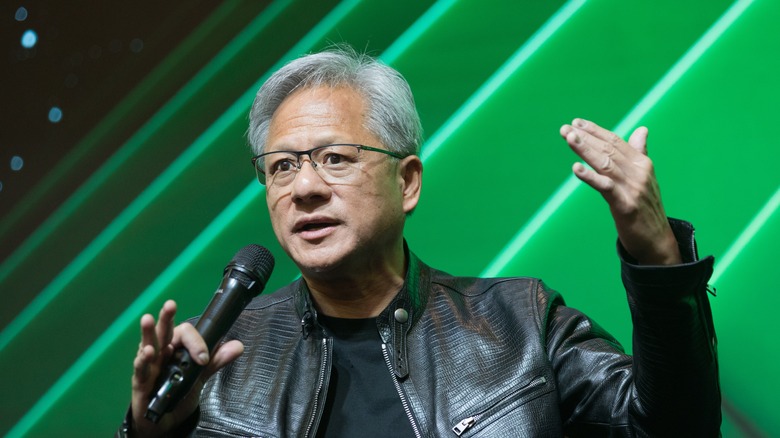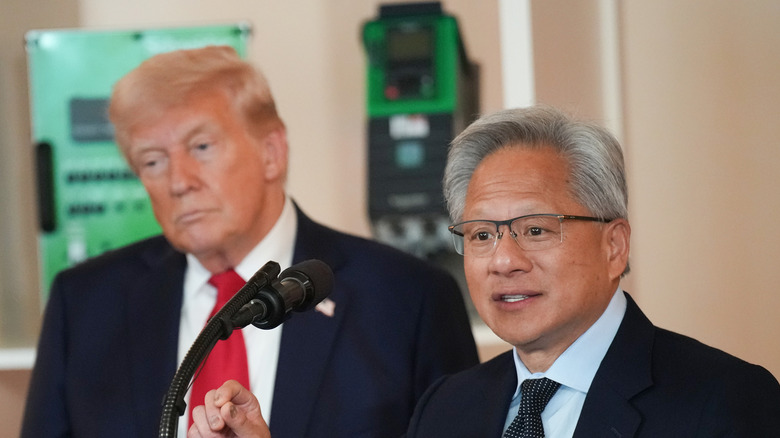Nvidia CEO Says These Two Trade Jobs Will Be Crucial To The AI Boom
One of the most pressing conversations in the current AI rush is the risk of job losses. Jensen Huang, who is currently riding the AI wave owing to the white-hot demand for Nvidia GPUs, has often discussed this aspect in interviews. Earlier this year, the Nvidia chief mentioned that some jobs will go away, but added that new roles will also be created, while adding that every existing job will forever change due to the integration of workflows. But it appears that not all jobs, in Huang's opinion, will feel the AI pinch. On the contrary, roles that are fundamental to building and maintaining the vast AI computing infrastructure could prosper in the immediate future. Electricians and carpenters appear to be two such roles that Huang sounds bullish about.
@c4news CEO of US chip giant Nvidia, Jensen Huang, tells Channel 4 News, that 'electricians and plumbers' will be the big winners in the AI race as the skilled craft segment of every economy is going to see a 'boom'. Tech AI Nvidia Economy C4News
"If you're an electrician, you're a plumber, if you're a carpenter — we're gonna need hundreds of thousands of them to build all of these factories. The skilled craft segment of every economy is gonna see a boom," Huang said in an interview with Channel4News. Answering a reporter's question about building AI data centers worth hundreds of billions of dollars and computing infrastructures, he mentioned that stakeholders will be doubling their investment every single year due to sheer demand and need. "I think you're going to be building out AI infrastructure here in the UK for a decade." Citing the example of the Industrial Revolution, Huang mentioned that it came out of need. And as such, the AI boom and its affiliated fields won't be much different.
But why electricians?
Huang's comments about the unprecedented need for electricians to support the AI wave are not unfounded. The biggest stakeholders in the field of AI are acutely aware of the looming problem that is the shortage of skilled electricians and data center engineers. "I've even told members of the Trump team that we're going to run out of electricians that we need to build out AI data centers. We just don't have enough," BlackRock chief Larry Fink was quoted as saying by Reuters. Microsoft chief, Brad Smith, also shed light on the looming crisis during a Congressional hearing.
"Perhaps the single biggest challenge for data center expansion in the United States is a national shortage of people—including skilled electricians and pipefitters," Smith said, adding that the experts are crucial for construction, system installation, and maintenance of power systems. According to the Center for Strategic and International Studies, the US will need a boost in the number of electricians available to support the AI infrastructure demands, something that would require more than just upskilling.
"The estimated demand of 140,000 new skilled jobs by 2030 cannot be met without expanding instructional capacity, modernizing facilities, improving retention, and addressing immigration and licensure gaps," says the CSIS analysis. The shortage is so acute that Google has even launched a program that provides millions of dollars in funding to the electrical training ALLIANCE (etA) in order to train 100,000 electrical workers and 30,000 new apprentices in the US with the specific goal of feeding the AI infrastructure demand.
All hype, or substance, too?
Huang's approach to the debate around AI being a risk to jobs is quite balanced, and far from the doom-and-gloom viewpoint of multiple experts, even though the company is investing big across the board, including a $100 billion investment in OpenAI. Ford chief Jim Farley recently claimed that AI will "replace literally half of all the white-collar workers in the US."Anthropic chief Dario Amodei recently gave a similar chilling prediction in an interview, which Axios framed as a "white-collar bloodbath." Amazon, one of the biggest names in the AI and cloud infrastructure business, is also warning about a similar grim situation.
"We will need fewer people doing some of the jobs that are being done today," Andy Jassy, Amazon's chief, recently wrote in a note to employees. Some major tech players have already started making the hard choice between human employees and AI tools. "Before asking for more Headcount and resources, teams must demonstrate why they cannot get what they want done using AI," Shopify CEO Tobi Lutke recently said in an internal memo.
A few weeks ago, Accenture laid off a staggering 11,000 employees, and its CEO warned that it would let go of staff who wouldn't embrace AI and upskill them. Huang's focus is also more inclined towards the AI awareness situation than the rough replacement theory. The Nvidia chief, who is also betting big on the convergence of quantum computing and AI, recently made a bold claim that every role will be affected by AI with immediacy. However, he added that AI won't directly take away jobs, but people will be replaced by those who are adept at using AI tools.


